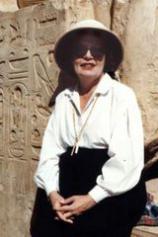Excerpt
Excerpt
Children of the Storm

Chapter One
The encrimsoned sun sank slowly toward the crest of the Theban
mountains. Another glorious Egyptian sunset burned against the
horizon like fire in the heavens.
In fact, I did not at that moment behold it, since I was facing
east. I had seen hundreds of sunsets, however, and my excellent
imagination supplied a suitable mental picture. As the sky over
Luxor darkened, the shadows of the bars covering doors and windows
lengthened and blurred, lying like a tiger's stripes across the two
forms squatting on the floor. One of them said, "Spoceeva."
"Russian," Ramses muttered. scribbling on his notepad. "Yesterday
it was Amharic. The day before it sounded like -- "
"Gibberish," said his wife.
"No," Ramses insisted. "It has to mean something. They use root
words from a dozen languages, and they obviously understand one
another. See? He's nodding. They are standing up. They are going
... " His voice rose. "Leave the cat alone!"
The Great Cat of Re, stretched out along the back of the settee
behind him, rose in haste and climbed to the top of his head, from
which position it launched itself onto a shelf. Ramses put his
notepad aside and looked severely at the two figures who stood
before him. "Die Katze ist ganz verboten. Kedi, hayir. Em nedjeroo
pa meeoo."
The Great Cat of Re grumbled in agreement. He had been a small,
miserable-looking kitten when we acquired him, but Sennia had
insisted on giving him that resounding appellation and, against all
my expectations, he had grown into his name. His appearance was
quite different from those of our other cats: longhaired, with an
enormous plume of a tail, and a coat of spotted black on gray. With
characteristic feline obstinacy he insisted on joining us for tea,
though he knew he would have to go to some lengths to elude his
juvenile admirers, who now burst into a melodious babble of
protest, or, perhaps, explanation.
"Darling, let's stick to one language, shall we?" Nefret said. She
was smiling, but I thought there was a certain edge to her voice.
"They'll never learn to talk if you address them in ancient
Egyptian and Anglo-Saxon."
"They know how to talk," Ramses said loudly, over the duet.
"Recognizable human speech, however -- "
"Say Papa," Nefret coaxed. She leaned forward. "Say it for
Mama."
"Bap," said the one whose eyes were the same shade of
cornflower-blue.
"Perverse little beggars," said Ramses. The other child climbed
onto his knee and buried her head against his chest. I suspected
she was trying to get closer to the cat, but she made an engaging
picture as she clung to her father. They were affectionate little
creatures, much given to hugging and kissing, especially of each
other.
"They're over two years old," Ramses went on, stroking the child's
black curls. "I was speaking plainly long before that, wasn't I,
Mother?"
"Dear me, yes," I said, with a somewhat sickly smile. To be honest
-- which I always endeavor to be in the pages of my private journal
-- I dreaded the moment when the twins began to articulate. Once
Ramses learned to talk plainly, he never stopped talking except to
eat or sleep, for over fifteen years, and the prolixity and
pedantry of his speech patterns were extremely trying to my nerves.
The idea of not one but two children following in the paternal
footsteps chilled my blood.
Ever the optimist, I told myself there was no reason to anticipate
such a disaster. The little dears might take after their mother, or
me.
"Children learn at different rates," I explained to my son. "And
twins, according to the best authorities, are sometimes slower to
speak because they communicate readily with one another."
"And because they get everything they want without having to ask
for it," Ramses muttered. The children obviously understood
English, though they declined to speak it; his little daughter
raised her head and fluttered her long lashes flirtatiously. He
fluttered his lashes back at her. Charla giggled and gave him a
hug.
The question of suitable names had occupied us for months. I say
"us," because I saw no reason why I should not offer a suggestion
or two. (There is nothing wrong with making suggestions so long as
the persons to whom they are offered are not obliged to accept
them.) Not until the end of her pregnancy did I begin to suspect
Nefret was carrying twins, but since we had already settled on
names for a male or a female child, it worked out quite nicely.
There was no debate about David John; no one quarreled with
Ramses's desire to name his son after his best friend and his
cousin who had died in France in 1915.
A girl's name was not so easy to find. Emerson declared (quite
without malice, I am sure) that between our niece and myself there
were already enough Amelias in the family. It was with some
hesitation that I mentioned that my mother's name had been
Charlotte, and I was secretly pleased when Nefret approved.
"It is such a nice, ordinary name," she said.
"Unlike Nefret," said her husband.
"Or Ramses." She chuckled and patted his cheek. "Not that you could
ever be anything else."
Charla, as we called her, had the same curly black hair and dark
eyes as her father. Her brother Davy, now perched on his mother's
knee, was fair, with Nefret's blue eyes and Ramses's prominent nose
and chin. They did not resemble each other except in height, and in
their linguistic eccentricity. Davy was more easygoing than his
sister, but he had a well-nigh supernatural ability to disappear
from one spot and materialize in another some distance away. The
bars had been installed in all the rooms they were wont to inhabit,
including the veranda, where we now sat waiting for Fatima to serve
tea ...
Excerpted from CHILDREN OF THE STORM © Copyright 2003 by
Elizabeth Peters. Reprinted with permission by Avon, an imprint of
HarperCollins Publishers. All rights reserved.




